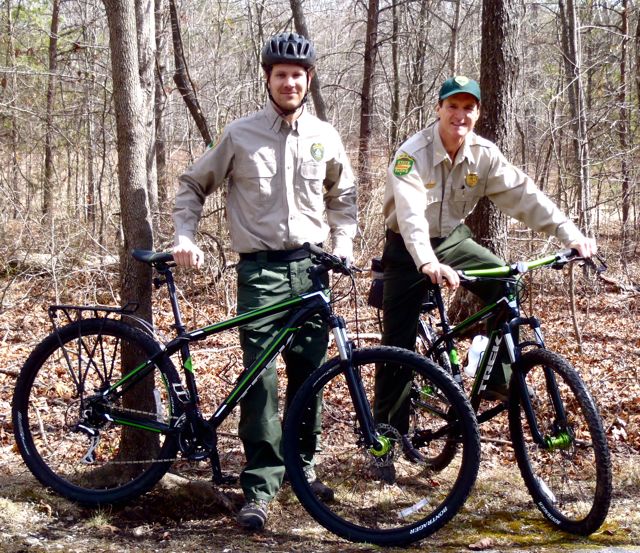 South Cumberland State Park ranger Jason Reynolds, left, and park manager John Christof show off two of three new mountain bikes donated by the Friends of the South Cumberland State Park to help rangers patrol the back-country. The rangers plan to use the bikes for some duties rather than pickup trucks and four-wheelers that are less environmentally friendly.
Contributed photo/South Cumberland State Park
South Cumberland State Park ranger Jason Reynolds, left, and park manager John Christof show off two of three new mountain bikes donated by the Friends of the South Cumberland State Park to help rangers patrol the back-country. The rangers plan to use the bikes for some duties rather than pickup trucks and four-wheelers that are less environmentally friendly.
Contributed photo/South Cumberland State ParkSouth Cumberland State Park rangers now can be seen out of their cars, off their four-wheelers and aboard new mountain bikes, thanks to a gift from the park's friends group.
In December, park manager John Christof asked the Friends of South Cumberland State Park to fund the rangers' request for bikes, as such items deemed nonessential are difficult for the park to buy under current budget constraints.
"When the rangers showed interest in having bikes, we were excited to help supply them with this, as the request fits well within our mission of supporting the park," said Ty Burnette, Friends president.
Supplying the bikes is great for the public image of the park and its environmental conscience, Burnette said.
The outfitted Trek mountain bikes, bought from Woody's Bicycles in Sewanee, Tenn., have racks and packs and cost $650 each. The group has given three of them to the park.
The bikes are stationed at Stone Door, the Savage Gulf Ranger Station and at the Visitor Center/Fiery Gizzard.
Jason Reynolds, a park ranger for 10 years, sees the bikes as an asset for the large and constantly expanding 25,000-acre park. He spends most of his time doing boundary inspections and patrolling.
"Bikes make our job easier, as they are more nimble, less invasive and quieter," he said.
Christof has been working at the park since 1981 and has been using his own bike to patrol some trails on his days off. Having the bikes will save the rangers time and help make the park safer, he said.
He said the bicycles also will allow rangers to work in a more environmentally friendly way, reduce maintenance cost on the park's four-wheel-drive trucks and let the rangers get more exercise.
Reynolds said having a bike will save him time on trail maintenance, as areas he used to have to hike up to five miles to reach are more easily accessed with a bike.
The bikes also will help expand the park's anti-poaching operations, he said, as they will be "quieter and faster" on patrol in areas where poaching has been a problem.
